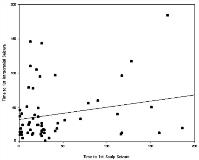TIME TO FIRST INTRACRANIAL EEG SEIZURE IS NOT PREDICTED BY PRIOR SCALP EEG MONITORING OR GENERAL ANESTHESIA
Abstract number :
1.129
Submission category :
Year :
2003
Submission ID :
3960
Source :
www.aesnet.org
Presentation date :
12/6/2003 12:00:00 AM
Published date :
Dec 1, 2003, 06:00 AM
Authors :
Hrvoje Hecimovic, Hrayr P. Attarian, James A. Fessler III, Lawrence Eisenman, Ebru Altay-Erbayat, Timothy Lynch, Kelly Brown, Tori Vahle, Jeffrey G. Ojemann, Joshua Dowling, Frank Gilliam Department of Neurology, Washington University School of Medicine,
Various general anesthetics have been used in treatment of status epilepticus and to suppress cerebral activity, although some agents also exhibit epileptogenicity. The association of their potential seizure inhibition has not been studied in the setting of intracranial EEG monitoring. We hypothesized that general anesthesia increases time to first seizure, i.e. that general anesthesia have a transient but clinically relevant antiepileptic effect. In addition, we assessed whether time to first scalp seizure correlated with time to first intracranial seizure.
We evaluated times to first seizure for Phase I scalp and Phase II intracranial EEG in 70 consecutive epilepsy surgery patients at our Adult Epilepsy Center from February 1999 to April 2003. We used paired Student[apos]s t-test to compare group means, and Pearson bivariate correlation to compare continuous variables.
Mean age of patients was 36[plusmn]10.63 years and 57.1% were women, 51 patients had temporal and 19 patients had extratemporal epilepsy. Time to first scalp seizure was 42[plusmn]47.31 hours and time to first intracranial seizure was 41[plusmn]40.18 hours (paired Student[apos]s t-test, p value was 0.798). There was no correlation between time to first scalp Phase I seizure and intracranial Phase II recorded seizures (Pearson bivariate correlation, r= 0.21).
General anesthesia does not appear to have a clinically significant effect in the setting of intracranial EEG monitoring, with acute antiepileptic medication cessation. Further, time to first scalp EEG seizure does not predict time to first intracranial EEG seizure.[figure1]
[Supported by: The Epilepsy Foundation fellowship grant to H. Hecimovic.]
